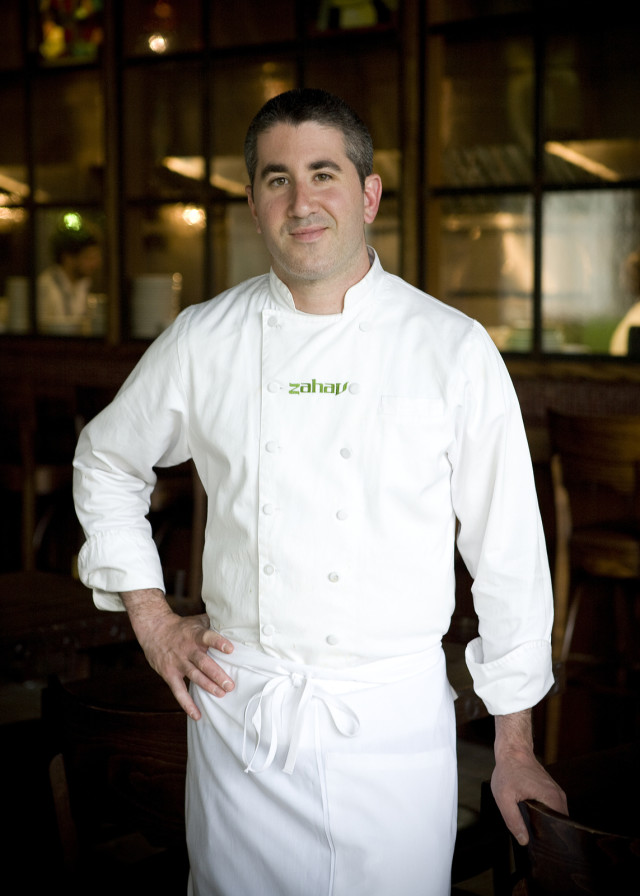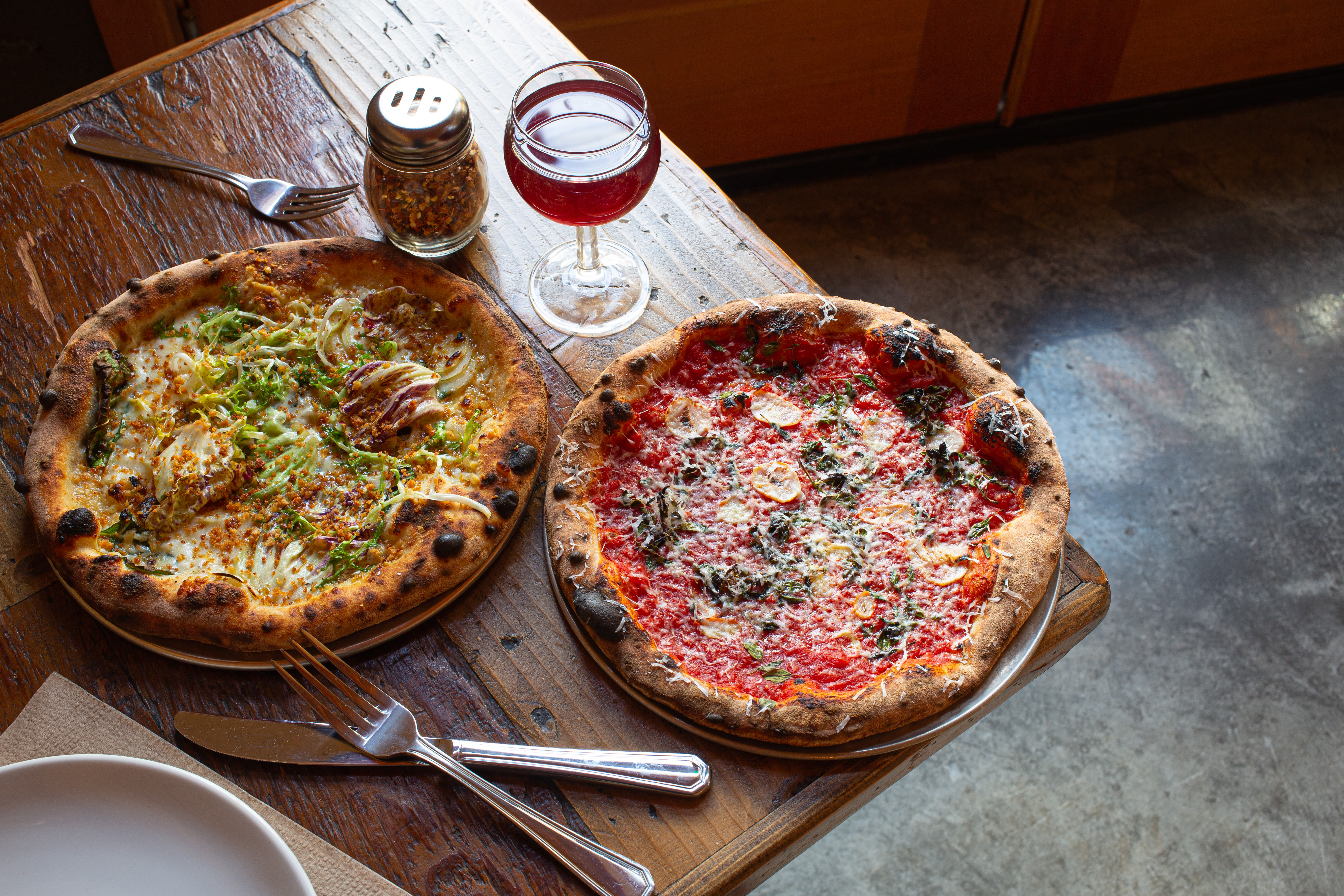Q&A: Zahav's Michael Solomonov

Michael Solomonov, chef/owner of Zahav Restaurant in Philadephia
Image: Michael Persico
Late last September, a crazy chomping sound rang out from Pacific Northwest longitudes and latitudes. It was the joyful noise of 8,000 eaters and chefs who convened from coast-to-coast for non-stop eating at the first Feast Portland, an original food festival inspired by Portland's handcrafted ethos, Oregon's small-batch disillers, coffee roasters, prize-winning wines, and pioneers of palate-pushing brews.
Over four days, Feast transformed the Rose City into a wild garden of eating and food conjuring, as the likes of grilled Thai mussels-on-a-stick, beef knuckle marmalade, and “farm-cured lamb, smoked, stuffed and poked” turned an urban city into the food equivalent of Burning Man. There were classes, smack-downs, freestyle dinners, and plenty of food for thought. At after parties and after-after parties, new friends and fresh cooking alliances were made and sworn forever.
Bon Appétit Presents Feast Portland, the sequel, lands September 19 through 22, 2013. It's an opportunity to celebrate the food town that defied the gods of gastronomy, sit in on conversations with leading food thinkers, and inhale everything that makes Portland's food scene awesome. Feast also has a charitable component: net proceeds benefit Partners for a Hunger-Free Oregon and Share Our Strength (Feast donated over $46,000 to these hunger relief organizations in its inaugural year).
To count down to the event, we've interviewed some of the visiting cooks and food writers ready to help make Feast an unforgettable culinary throw-down. (Check out remaining tickets here)
Up first: Iconoclastic, Israeli-born chef Michael Solomonov, who changed the Mid-East food conversation at Philly's Zahav. We thought we knew Mid-East food. Turns out not at all.
Drawing from every molecule of flavor in the region and adding idea of his own, Solomonov has elevated, modernized and stretched a cuisine into something new and exhilarating. In Solmonov's hands, falafel shares space with duck hearts and jasmine rice percolates in pumpkin juice. Even hummus gets fresh consideration on Zahav's menu, including a Turkish number warmed with butter. Solmonov fits Portland's comfort-loving ethos perfectly: he also owns the cultist Federal Donuts and the smoking Percy Street Barbecue.
Karen Brooks: Why is everyone suddenly interested in Middle Eastern food?
Michael Solomonov: I think that Middle Eastern food—and Israeli food, in particular—is sort of ‘the last frontier.’ Mediterranean food cultures have been explored in depth, and Israeli cuisine relies on many of the same building blocks as Greek and Italian cooking, but with the addition of Balkan and Middle Eastern influences, making it wonderfully diverse and fresh.
Philly is a food city on the rise. What did it look like 10 years ago and what makes it stand out from all the other up-and-coming food cities? Should we be booking our flights now?
You absolutely should be! Philly is vibrant and ever changing, but also approachable—historically, it’s been a blue collar kind of town, so even with the current influx of talented chefs and restaurateurs, it remains easy to eat here. Plus, it’s a very walk-able city, which makes it easy to visit a lot of places, and compared to many other great food cities, we’re incredibly inexpensive, which has drawn a lot of interesting talent here.
Zahav's menu kicks off with no less than four approaches to hummus. What's the secret to a great one?
Really, really good tehina is key. At Zahav, we use Soom, an artisanal product that is crafted in Israel from the highest grade of Ethiopian sesame seeds.
Mid-East mania. Fried chicken and donuts. Texas barbecue. What's the through line for you?
My partner, Steve Cook, and I cook things that we like to eat, and we open restaurants that we like to eat at. I guess you could say our style is ‘unpredictable’—we’re predictably hard to predict.
Why do few restaurant owners get beyond falafel and shwarma?
Until recently, ‘Middle Eastern’ restaurants in America were often opened by businessmen from that region who emigrated over and were neither chefs nor restaurateurs. Today, I find more and more chefs who are proud of their heritage and want to share it, which dovetails nicely with diners’ renewed interest in authentic foods from cultures outside of their own.
Your five essential ingredients to build an exciting Mid-East pantry?
Start with the obvious: olives and olive oil. For sweeteners, look to honey. To brighten and freshen up a dish, grab some lemons. Then, add deep savory notes with za’atar and tehina. With these five ingredients, you can instantly add Israeli flavor components to just about any ‘canvas,’ from fish to poultry to meat to vegetables—and yes, even desserts.
Most essential cookbook for people who want to cook like Mike?
I’ve been tremendously influenced by Janna Gur’s gorgeous The Book of New Israeli Food: a Culinary Journey, a vivid and involving look at contemporary cooking in Israel. It’s a must-read.
Michael Solomonov will join the global street food vendors at the USA Pears Night Market (presented by Snake River Farms), Sept 20, and cook a dinner at Levant, Sept. 22. Both events are sold out. Portland Monthly is a sponsor of Feast Portland.




